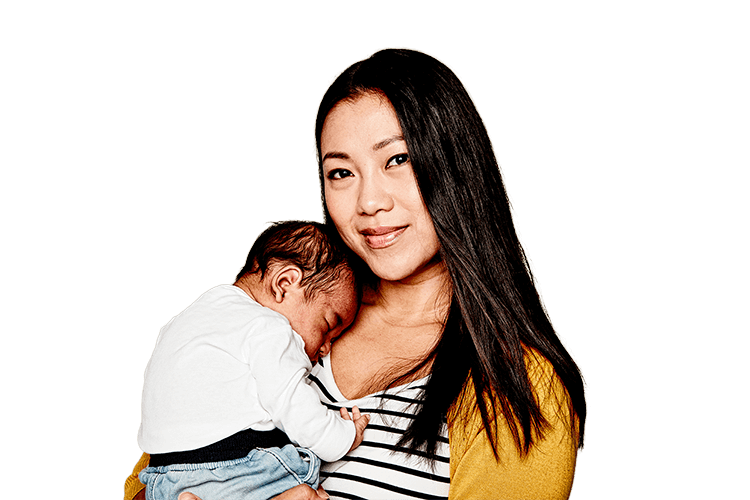Spotting the early signs of pregnancy isn’t always easy. If you’re actively trying to conceive every twinge or hint of nausea might be enough to have you taking a pregnancy test. For those who aren’t, putting two and two together can be more difficult. Why am I so tired? Why this sudden inexplicable craving for yoghurt? Do I really need to pee again?
We’ve taken a look at some of the signs of early pregnancy, from the most common (hello sore boobs) to the not-so-common (soil sandwich anyone?).

Missed period
Missing your period is one of the first and surest signs that you might be pregnant. However, some women may still experience light bleeding in the early stages of pregnancy.
Remember that you can also miss your period for a variety of other reasons including stress, certain medications, weight loss or gain and hormonal imbalances. The only way to be sure that the cause is pregnancy is to take a test!
Feeling sick
Suffering from nausea or unable to stomach your favourite foods? Morning sickness might be at work here! Morning sickness most commonly occurs in the early stages of pregnancy and can be one of the first indicators that you may be pregnant. Despite its commonly-used name, morning sickness can occur at any time of the day or night.
MORE: Morning sickness: what, why and how to deal.
Changes in your breasts
Larger, more tender and swollen breasts can all be indicators of pregnancy. Look out for more visible veins and darker nipples.
Changes in smells and tastes
Suddenly can’t stomach your favourite meal? Does the smell of your partner’s aftershave give you a headache? Perhaps you suddenly can’t get enough of something you never would have eaten before. Pregnancy can affect the way you react to tastes and smells, meaning that you suddenly like things you didn’t before or certain smells appear to be much stronger.
Some women even develop cravings for non-food items such as soil. This may indicate a nutrient deficiency so it’s best to step away from the flower bed and seek advice from your doctor if you experience this symptom.
Frequent urination
Feeling like you need to pee more often than usual, including during the night can be an indicator of pregnancy. Conversely you may also find yourself feeling constipated. If you experience any changes to your usual bowel movements it’s worth consulting your doctor.
Feeling tired
Growing a baby is a full on job, and a tiring one at that. The culprit? A massive increase in progesterone which is needed to maintain your pregnancy. Whilst we’re all guilty of the 3pm slump, it’s common to feel tired or even exhausted throughout the day in the first trimester of pregnancy as a result of hormonal changes. You might also feel more emotional and teary than usual. So be kind to yourself and try to rest as much as you can.
Breathlessness
Progesterone does more than make you feel sleepy. It also increases your lung capacity to help you carry more oxygen to your baby and get rid of the extra carbon dioxide produced. This means you breathe more deeply which can make you feel short of breath. Whilst this is normal, you should contact your doctor if you experience pain, palpitations, extreme tiredness or increased breathlessness during exercise.
Heartburn and indigestion
Indigestion is annoying at the best of times, but during pregnancy this is more common than usual and is related to your growing uterus and the pressure it is putting on the organs of the abdomen. Try eating smaller and more frequent meals, avoid spicy or fatty foods, and try raising your head with more pillows at night time to relieve it.
Vaginitis
Vaginitis is an inflammation of the vagina and is uncomfortable and distressing for many women. It is more frequent during pregnancy. However it’s important to remember that vaginitis can be caused by thrush, vaginosis and even chlamydia, so it’s important to seek medical advice if you think you may have symptoms of this.
Just ‘feeling pregnant’
Intuition is a powerful thing and many women claim to just ‘know’ when they’re pregnant. It might be why you’re reading this list right now! Whether or not you ‘feel pregnant’, many women report not feeling like their usual selves led to them taking a pregnancy test. Whilst not feeling pregnant isn’t a reason to not take a test, if you’re feeling a little off colour, nauseous or overly emotional it might be worth thinking about whether these could be side effects of pregnancy!
Need a little extra support?
Health Concierge
Eligible members with hospital cover can now talk to a member of our Health Concierge team for advice and guidance on how to have a healthy pregnancy, at no extra cost on 1800 789 414.#
Got a health question? 24/7 Medibank Nurse Support
Medibank health insurance members can chat to a registered nurse over the phone or online to discuss any health questions or concerns at no extra cost.~ Chat online or call 1800 644 325 24 hours a day, 7 days a week.
24/7 Medibank Mental Health Support
Medibank members with health insurance can talk with a mental health professional over the phone or online in relation to any mental health or emotional concern at no extra cost.~ Log in or call 1800 644 325, 24 hours a day 7 days a week.
Looking for something else?
Visit Medibank Planning, Pregnancy and Parenting for a range of tools and advice to help you at every stage of your pregnancy journey.
Help the way you want it
Contact us
Call us on 134 190 to speak to a consultant. Alternatively, chat to us 24/7 online.
Self-service options
Login to MyMedibank or Download the MyMedibank App for self service options.
Find a specialist
Find a specialist or Member's choice hospital using our find a provider tool.

Things you should know
~ Some referred services may involve out of pocket costs and waiting periods may apply.
# Health Concierge is available to all eligible Medibank members who hold hospital cover. Excludes Overseas Visitor Health Cover, Working Visa Health Cover and Overseas Student Health Cover (OSHC). Some referred services may involve out of pocket costs.
While we hope you find this information helpful, please note that it is general in nature. It is not health advice, and is not tailored to meet your individual health needs. You should always consult a trusted health professional before making decisions about your health care. While we have prepared the information carefully, we can’t guarantee that it is accurate, complete or up-to-date. And while we may mention goods or services provided by others, we aren’t specifically endorsing them and can’t accept responsibility for them. For these reasons we are unable to accept responsibility for any loss that may be sustained from acting on this information (subject to applicable consumer guarantees).